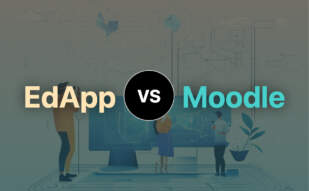When comparing Moodle and Schoology, prefer Moodle for its vast global support and more comprehensive feature suite. However, Schoology shines in curriculum management, edtech integration, and suits K-12 and corporate environments.

Key Differences Between Moodle and Schoology
- Coding: Moodle is an open-source platform with well-documented resources, Schoology offers robust content creation tools via a rich text editor.
- Support: Moodle offers global support via 80+ service companies, Schoology’s support is managed by the parent company, PowerSchool.
- Price: Moodle is open-source and cost-free, Schoology’s pricing depends on user count, feature inclusion, and institution size.
- Interoperability: Both platforms support third-party integrations, Moodle provides seamless integration with several platforms, while Schoology boasts interoperability with an existing LMS.
- Customization: Moodle offers extensive customization, including multi-lingual support and gamification features. Schoology allows granular role creation, standards alignment, and a robust App Center.
- Target Audience: Moodle is adopted by various sectors globally, whereas Schoology is primarily aimed at K-12 schools, higher education, and corporate environments.
- Platform: Moodle is accessible on Linux, Mac, Windows, web-based, mobile-compatible, cross-browser compatible. Schoology is web-based with native apps for iOS, Android, Kindle devices.
| Comparison | Moodle | Schoology |
|---|---|---|
| Type | Open Source learning platform | Cloud-based learning management solution |
| Feature Integration | Forums, wikis, chats and blogs | Google Drive and Microsoft OneDrive resources |
| Usability | Web, mobile, cross-browser | Web, iOS, Android, Kindle |
| Support | Extensive resources available through Moodle Partners and Service Providers | PowerSchool Support |
| Learning Methods | Asynchronous and synchronous learning | One-to-one, self-paced, fully online, blended learning |
| Customization | Badge customization, design assurance | Grading/Assessment tools, course content creation and rearrangement |
| Curriculum Support | All-in-one learning system | Curriculum management and instruction |
| Integrations | API, BigBlueButton, Dropbox, G Suite, Google Calendar, Office 365, OneDrive, Outlook Calendar, PayPal, Zapier, Zoom | Google and Microsoft |
| User Experience | Active 213 million+ users as of June 2020 | Used globally with millions of users |
What Is Moodle and Who’s It For?
Moodle is a robust, secure, and integrated single learning platform tailor-made for educators, administrators, and learners. Fueled by over 10 years of development rooted in social constructionist pedagogy, it’s a malleable, cost-efficient software that’s financially backed by 80+ Moodle Partner service companies worldwide. Geared for institutions and organizations as diverse as Shell, London School of Economics, and Microsoft, it serves those seeking a learner-centric, customizable, and scalable solution for both blended learning and 100% online courses.

Pros of Moodle
- No licensing fees, open-source software
- Multi-lingual support, 120+ languages
- All-in-one learning platform, web-based, mobile-compatible, cross-browser compatible
Cons of Moodle
- Larger learning curve due to rich features
- Requires technical competency for advanced customization
- Community support can be inconsistent
What Is Schoology and Who’s It For?
Schoology, a product of PowerSchool, is a cloud-based learning management solution that specializes in curriculum management, course instruction, and system-wide resource sharing. With dynamic content creation tools, built-in grading and assessment modules, and an infrastructure for collaboration, it caters predominantly to K-12 schools. However, its adaptability extends to higher education and corporate environments. Perfectly suited for those seeking an intuitive, full-featured course assembler that also allows offline and online learning.

Pros of Schoology
- Allows management of assessments through the Schoology AMP
- Integration with Google and Microsoft, providing access to their resources
- Supports third-party integrations
Cons of Schoology
- Occasional user interface issues such as faulty notifications and page navigation
- Some premium features entail undisclosed fees
- Time investment required to learn, adapt, and implement effectively due to its robust features
Moodle vs Schoology – Dissecting The Better Choice
Unveiling the intricate details, Moodle and Schoology stand before us as the dual titans of the edtech world. But the question arises, which platform should you vouch for?
For Google-Oriented Users
When we talk Google-integration, Schoology holds the steering. Deeply woven into Google’s ecosystem, it lets users effortlessly swing between Google Drive and Microsoft OneDrive resources, thereby smoothing the learning curve.

For Open Source Advocates
If you’re driven by the open-source ethos, Moodle has the upper hand. With its GNU General Public License, there are no licensing fees attached, which appeals significantly to the large community of open-source disciples.

For Multilingual Audiences
For those keen on multi-lingual support, Moodle’s offering of 120+ languages overshadows Schoology. This plays a pertinent role, especially when dealing with a globe-spanning, diverse user base.

For Security-Conscious Users
Concerned about data security and user privacy? Look no further than Moodle. With its commitment towards safeguarding user data, it stands as a rock-solid choice for the cybersecurity-focused audience.

Grasping the multi facets, when your use-case beckons Google tools integration, Schoology has the edge. Moodle, however, appeals more with its open-source, multi-lingual, and security-concerned stand. The verdict? In application-rich, privacy-centric scenarios, Moodle emerges triumphant. For Google-affixed, efficiency-oriented folks, Schoology claims the victory crown.
Hannah Stewart
Content writer @ Aircada, tech enthusiast, metaverse explorer, and coffee addict. Weaving stories in digital realms.





